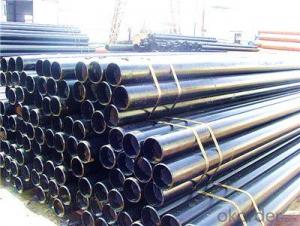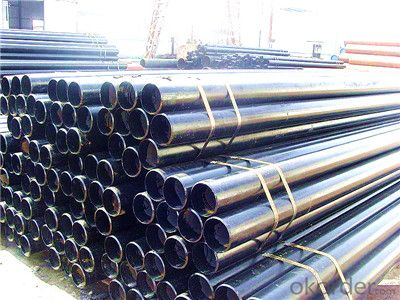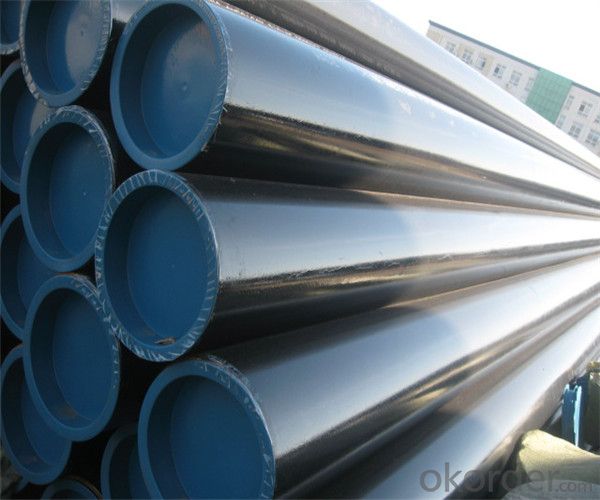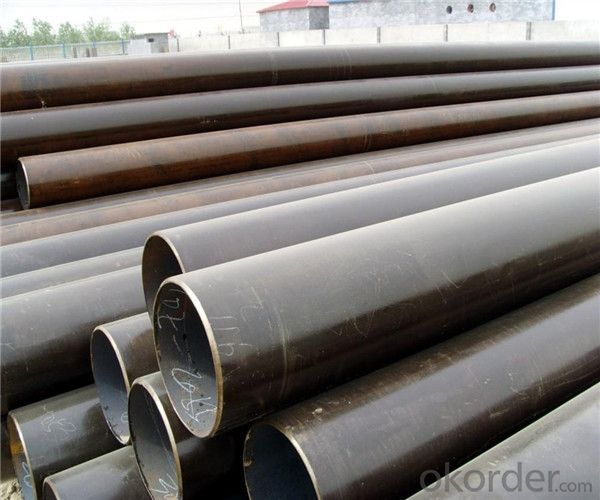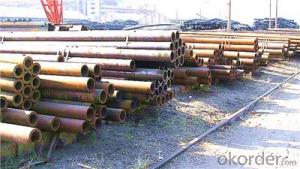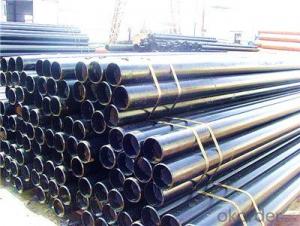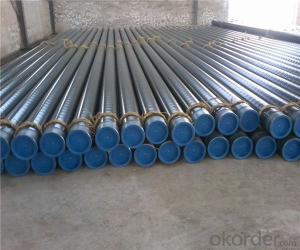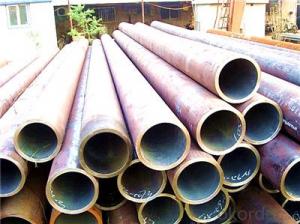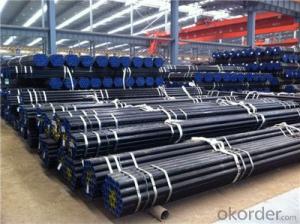Seamless Steel Pipe High Quality and Reasonable Price
- Loading Port:
- Tianjin
- Payment Terms:
- TT OR LC
- Min Order Qty:
- 50 m.t.
- Supply Capability:
- 3000000 m.t./month
OKorder Service Pledge
OKorder Financial Service
You Might Also Like
PRODUCT DETAILS
1.Structure of Seamless Steel Pipe Description:
A large amount of Seamless Steel Pipes is offered to the clients at cost effective rates. These pipes are extremely durable, resistant to corrosion and have high tensile strength. Our pipes are used in nuclear plants, power plants, refineries and construction industry across the country. Furthermore, we are capable of providing these seamless pipes to the clients in bulk quantity.
2.Main Features of the Steel Pipe:
• High manufacturing accuracy
• High strength
• Small inertia resistance
• Strong heat dissipation ability
• Good visual effect
•Reasonable price
3.Seamless Steel Pipe Specification:
| Standard: | GB, DIN, ASTM,ASME, ASTM A106-2006, ASTM A53-2007 |
| Grade: | 10#,20#, 45#, 16Mn |
Thickness: | 8 - 33 mm |
| Section Shape: | Round |
| Outer Diameter: | 133 - 219 mm |
| Place of Origin: | Shandong, China (Mainland) |
| Secondary Or Not: | Non-secondary |
| Application: | Hydraulic Pipe |
| Technique: | Cold Drawn |
| Certification: | API |
| Surface Treatment: | factory state or painted black |
| Special Pipe: | API Pipe |
| Alloy Or Not: | Non-alloy |
| Length: | 5-12M |
| Outer Diameter: | 21.3-610mm |
| Packaging Details: | Seaworthy packages, bundles wrapped with strong steel strip |
5.FAQ of Seamless steel pipe:
①How is the quality of your products?
Our products are manufactured strictly according to national and internaional standard, and we take a test
on every pipe before delivered out. If you want see our quality certifications and all kinds of testing report, please just ask us for it.
Guaranteed: If products’ quality don’t accord to discription as we give or the promise before you place order, we promise 100% refund.
②How about price?
Yes, we are factory and be able to give you lowest price below market one, and we have a policy that “ for saving time and absolutely honest business attitude, we quote as lowest as possible for any customer, and discount can be given according to quantity”,if you like bargain and factory price is not low enough as you think, just don’t waste your time.Please trust the quotation we would give you, it is professional one.
③Why should you chose us?
Chose happens because of quality, then price, We can give you both.Additionally, we can also offer professional products inquiry, products knowledge train(for agents), smooth goods delivery, exellent customer solution proposals.Our service formula: good quality+good price+good service=customer’s trust.
SGS test is available, customer inspection before shipping is welcome, third party inspection is no problem.
Any question, pls feel free to contact us !
- Q: What is the standard length of a steel pipe?
- The industry and application dictate the standard length of a steel pipe, which can vary. In general, steel pipes typically range from 18 to 24 feet in length. These lengths find common usage in construction, plumbing, and various industrial applications. It is worth mentioning that custom lengths are also available to accommodate specific project needs.
- Q: What is the shear strength of steel pipes?
- The shear strength of steel pipes can vary based on a variety of factors including the grade and thickness of the steel, as well as the manufacturing process and any additional treatments or coatings applied. Steel pipes generally possess a high shear strength due to the inherent strength of steel as a material. Determination of shear strength is typically achieved through testing and can range from 50,000 to 80,000 pounds per square inch (PSI) for common grades of steel pipes. However, it is important to acknowledge that the shear strength can be considerably higher for specialized or higher-grade steel pipes that are specifically designed for applications such as offshore drilling or high-pressure systems. Therefore, it is advisable to refer to the manufacturer's specifications or engineering standards for precise and specific shear strength values for a particular steel pipe.
- Q: What are the different methods of pipe coating for steel pipes?
- Steel pipes can be coated using various methods, each with its own benefits and uses. One widely used technique is fusion bonded epoxy (FBE) coating. This involves heating the steel pipe and applying a thermosetting powder that melts and sticks to the surface, resulting in a robust and long-lasting coating. FBE coating is excellent for preventing corrosion and is commonly employed in the oil and gas industry. Another method is liquid epoxy coating, where a liquid epoxy resin is applied to the steel pipe's surface. Once it cures, it forms a protective barrier. Liquid epoxy coating is suitable for smaller pipes and provides good resistance to chemicals. Polyethylene (PE) coating is a popular option, especially for pipes that will be buried underground. It involves wrapping the steel pipe with a layer of polyethylene, which offers exceptional resistance against water, chemicals, and abrasion. Polyurethane (PU) coating is another choice, known for its high chemical resistance and flexibility. It is often used in offshore applications and extreme temperature environments. Other pipe coating methods include coal tar enamel (CTE) coating, which provides excellent water and chemical resistance, and concrete weight coating, which adds weight to the pipe for stability in underwater or subsea applications. To summarize, the available methods for coating steel pipes include fusion bonded epoxy (FBE), liquid epoxy, polyethylene (PE), polyurethane (PU), coal tar enamel (CTE), and concrete weight coating. The selection of a coating method depends on specific requirements, such as corrosion protection, chemical resistance, or stability.
- Q: What are the safety considerations when working with steel pipes?
- When working with steel pipes, safety considerations include wearing appropriate personal protective equipment such as gloves, safety glasses, and steel-toed boots to prevent injuries. It is essential to handle and lift steel pipes using proper techniques and equipment to avoid strains and falls. Ensuring a clean and organized work area, as well as securing pipes to prevent rolling or tipping, reduces the risk of accidents. Additionally, workers should be cautious of sharp edges and ensure proper ventilation when working with welding or cutting tools to minimize the risk of fires or inhalation hazards.
- Q: What are the advantages of using steel pipes in the manufacturing of storage tanks?
- There are several advantages of using steel pipes in the manufacturing of storage tanks. Firstly, steel pipes are highly durable and have a long lifespan, making them capable of withstanding high pressure and harsh environmental conditions. Secondly, steel pipes offer excellent resistance to corrosion, ensuring the integrity of the storage tank and preventing any leakage or contamination. Additionally, steel pipes are flexible and can be easily fabricated into various shapes and sizes, allowing for customization based on specific storage requirements. Lastly, steel pipes are cost-effective and readily available, making them a popular choice in the manufacturing industry.
- Q: Can steel pipes be used for pharmaceutical manufacturing plants?
- Yes, steel pipes can be used for pharmaceutical manufacturing plants. Steel pipes are commonly used in pharmaceutical manufacturing plants for various purposes such as conveying fluids, gases, and chemicals within the facility. They are preferred due to their durability, strength, and resistance to corrosion, making them suitable for maintaining the integrity and purity of pharmaceutical products. Additionally, steel pipes can be easily cleaned and sterilized, meeting the stringent hygiene and safety requirements of pharmaceutical manufacturing.
- Q: Can steel pipes be used for underground oil and gas pipelines?
- Yes, steel pipes are commonly used for underground oil and gas pipelines due to their durability, strength, and resistance to corrosion.
- Q: What are the applications of steel pipes in the automotive industry?
- Steel pipes are used in the automotive industry for a variety of applications, including exhaust systems, fuel lines, and structural components. They provide durability, corrosion resistance, and high strength, making them ideal for withstanding the harsh conditions and heavy loads experienced in automotive applications. Steel pipes also offer flexibility in design and can be tailored to meet specific requirements, ensuring efficient and reliable performance in vehicles.
- Q: How are steel pipes used in the construction of underground parking garages?
- Steel pipes are used in the construction of underground parking garages for various purposes, including providing structural support, serving as conduits for utilities such as water and electricity, and facilitating drainage systems. They are often used as deep foundation elements to support the weight of the structure and the vehicles above. Additionally, steel pipes are commonly used for installing fire suppression systems, ventilation systems, and plumbing connections within the parking garage.
- Q: What are the different methods of insulating steel pipes?
- There are several methods of insulating steel pipes, including using insulation wraps, foam insulation, fiberglass insulation, and pre-insulated pipe systems. Insulation wraps are typically made of materials like rubber or polyethylene and are wrapped around the pipe to provide thermal insulation. Foam insulation involves applying a layer of foam insulation directly onto the surface of the pipe. Fiberglass insulation is another common method, where fiberglass material is wrapped around the pipe to provide insulation. Pre-insulated pipe systems are complete pipe systems that come with built-in insulation and are ready to be installed. These methods help prevent heat loss or gain in the pipes, maintain temperature control, and prevent condensation.
Send your message to us
Seamless Steel Pipe High Quality and Reasonable Price
- Loading Port:
- Tianjin
- Payment Terms:
- TT OR LC
- Min Order Qty:
- 50 m.t.
- Supply Capability:
- 3000000 m.t./month
OKorder Service Pledge
OKorder Financial Service
Similar products
Hot products
Hot Searches
Related keywords
